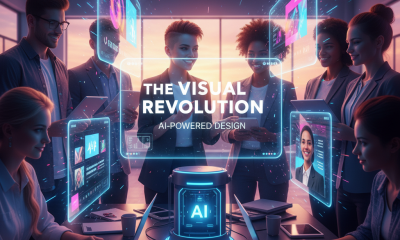Outplacement
The impact of AI and Digital Transformation on Tech Careers
Published
6 months agoon
By
Kaneez Fizza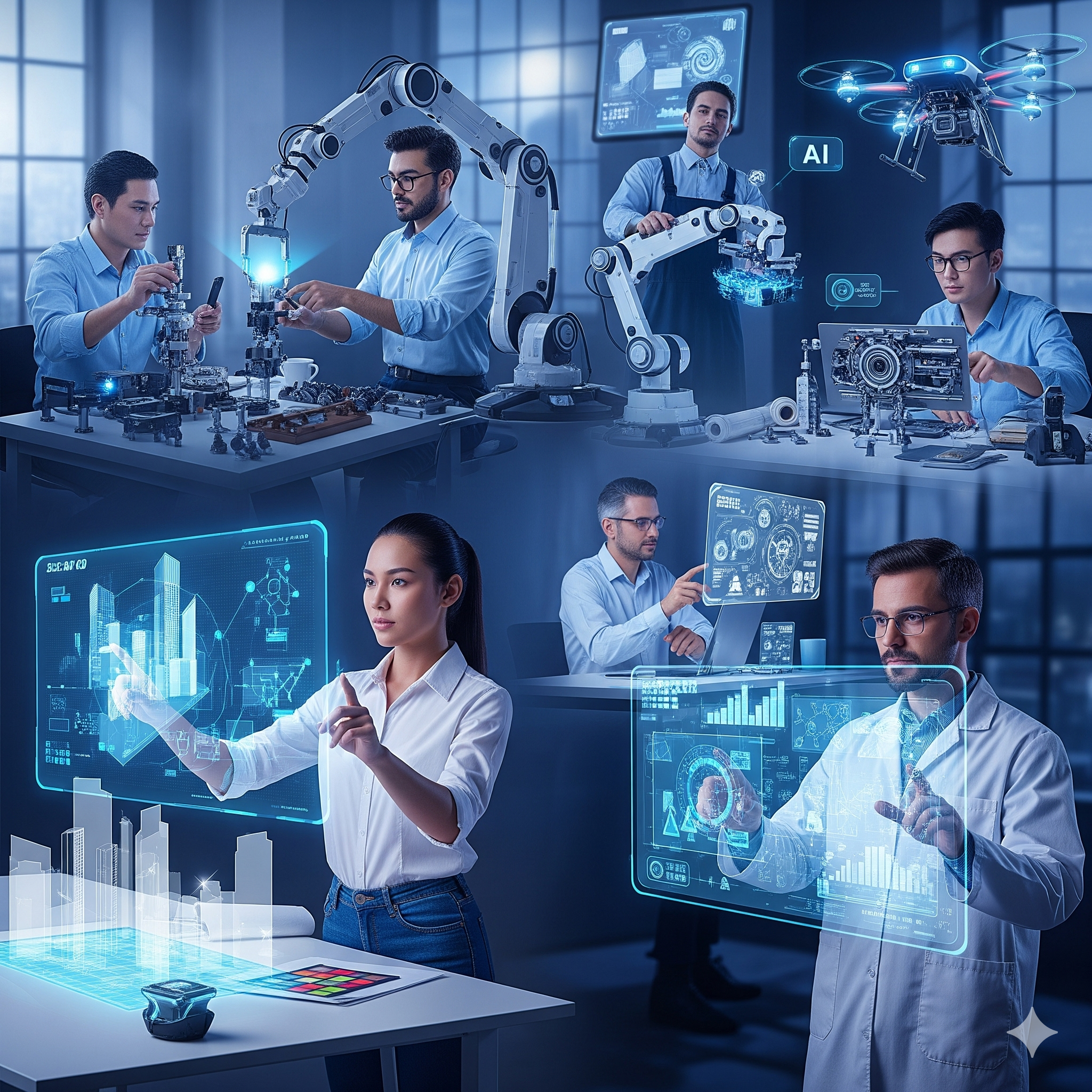
The Future of Tech is Now: How to Thrive in an AI-Powered World
Hey there, fellow tech enthusiasts and career explorers! Ever feel like you’re trying to catch a train that’s already left the station? I know I do sometimes. The pace of change in the tech industry, driven by the seismic shifts of AI and digital transformation, can feel a bit like a rollercoaster. One minute, a certain skill is golden, and the next, an AI tool has made it obsolete.
Honestly, it can be a bit intimidating. I remember a conversation with a friend, a senior developer who’s been in the game for over 20 years. He said, “I’ve been writing code since before the internet was a household name, and now I’m learning to talk to a robot to do my job. It’s like my career just got a new boss, and it’s a chatbot!” That’s how fast things are moving, and it’s a big part of why so many of you are feeling a bit lost.

Thrive in an AI-Powered Corporate World.
What a lot of people don’t realize is that this isn’t a new phenomenon; it’s just happening at an accelerated pace. Remember when the internet first hit? Or when mobile apps became the new frontier? Each time, it seemed like the old guard was going to be left behind, but instead, they adapted. This new era of digital transformation, fueled by AI, is just the latest evolution.
I get it, though. There’s a quiet panic setting in. You see job postings asking for experience with Artificial Intelligence tools you’ve never even heard of. You hear stories about companies automating tasks that used to be a full-time job. It’s the nagging thought that the career you’ve worked so hard for might be on a path to nowhere.
So, how do we navigate this? The answer isn’t to run from Artificial Intelligence but to run towards it. It’s about being proactive rather than reactive. The truth is, AI isn’t here to eliminate human talent; it’s here to augment it. The tech landscape is indeed being reshaped, and with that comes a host of new and exciting opportunities.
AI-Powered Careers
Think about this for a second: you’ve been a brilliant software developer for years. You’re fast, efficient, and you’ve got a great reputation. You’ve mastered multiple coding languages and built amazing applications. You’ve got a system, and it works.
However, lately, you’ve started to feel a pinch. You see newer, younger devs using Artificial Intelligence code assistants like they’re a second nature. Your boss mentions how they’re able to deliver projects twice as fast because of these new AI tools. You’re starting to feel like you’re not just competing with other people but with the very technology you helped create. It’s frustrating, right? The very skills that made you a rockstar are now being challenged by a machine.
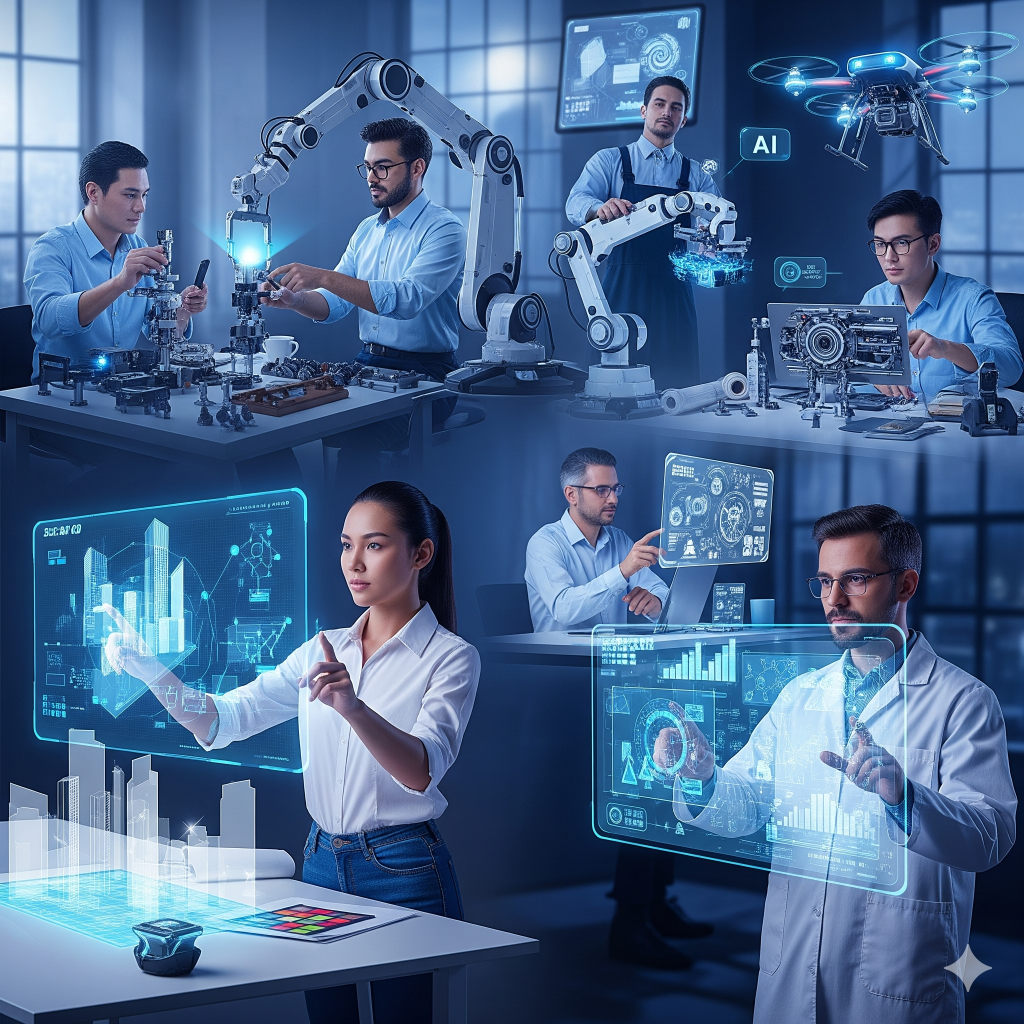
The future is here with AI powered careers.
The future is here with AI powered careers.The agitation builds as you realize this isn’t a temporary trend. This is the new normal. Your value proposition is shifting. Furthermore, the tasks you considered foundational—like writing boilerplate code or debugging simple errors—are becoming automated. You wonder, what’s my role going to be in five years? Is my experience even relevant anymore? It’s like a coder’s mid-life crisis, but instead of buying a sports car, you’re wondering if you need to learn how to prompt an AI for a living.
But here’s the solution. Instead of seeing AI as a threat, see it as the ultimate productivity hack. The goal isn’t to compete with the AI but to become the master of it. The future belongs to those who can leverage AI to do the routine work, freeing themselves up to focus on the truly human aspects of tech:
- Creativity and Innovation: While AI can generate code, it can’t invent a new product category or envision a user experience that doesn’t yet exist. It’s fantastic at solving problems it’s been trained on, but it struggles with novel, abstract challenges. Your job is to be the visionary, the architect. I’ve seen a developer use an AI tool to automate 90% of a mundane refactoring task, then use that saved time to prototype a completely new feature that no one had even thought of. That’s the kind of value AI can’t replicate.
- Strategic Thinking: AI can analyze a mountain of data and tell you what’s happening, but it can’t tell you why or what to do next in a complex business context. It lacks the intuition and the business acumen to connect a technical solution to a real-world market need. A senior developer I know recently told me about using an AI to analyze customer feedback from a hundred different sources. The Artificial Intelligence gave her a summary, but she was the one who then translated those insights into a new product roadmap, justifying the business case to her executive team. That’s a fundamentally human role.
- Ethical Oversight: This is a huge one. As AI becomes more integrated into our lives, from hiring software to medical diagnostics, the ethical implications are massive. An AI could be trained on biased data, leading to unfair outcomes. Who’s responsible for catching that? You are. The demand for professionals who understand not just how to build an Artificial Intelligence but how to build a fair and responsible Artificial Intelligence is soaring. This is where your moral compass and critical thinking skills become your most valuable assets.
- Emotional Intelligence: Look, an Artificial Intelligence can write an email, but it can’t read the room in a tense project meeting. It can’t mentor a junior developer struggling with impostor syndrome. Nor can it build rapport with a client and understand their unspoken needs. As more routine tasks are automated by AI, the soft skills—the human skills—are becoming the hard skills. Your ability to lead a team, collaborate effectively, and communicate complex ideas with empathy will be the cornerstone of your career. It’s a key differentiator and a skill that will only grow in importance in an AI-powered world. After all, you can teach a machine to code, but you can’t teach it to care.
AI Isn’t Just Taking Jobs, It’s Creating New Ones
You might be surprised to learn that AI isn’t just taking jobs; it’s creating entirely new, high-value ones. I was talking with an HR manager the other day, and she told me they’re actively hiring for roles that didn’t even exist five years ago. This digital transformation is fundamentally rewiring what companies need, shifting the focus from manual tasks to strategic oversight and ethical considerations.
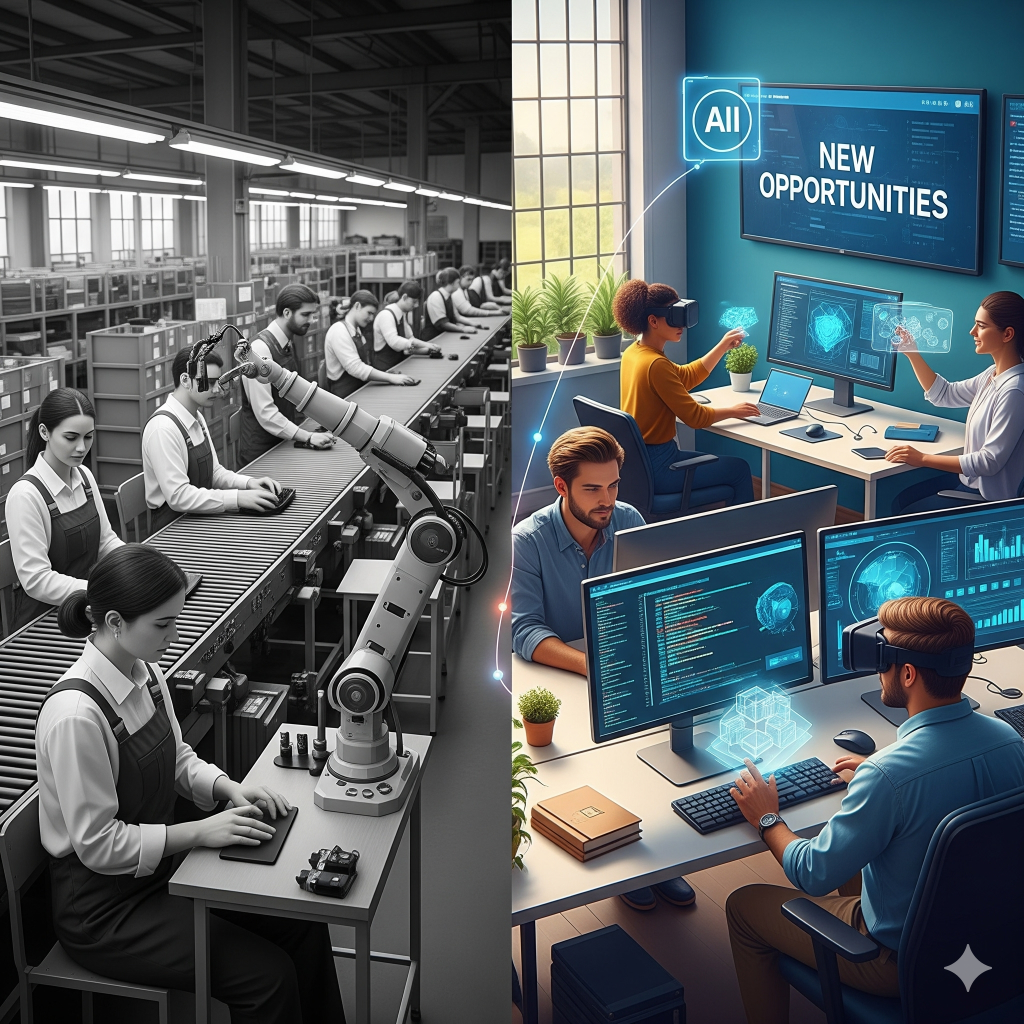
AI and digital transformation create new job roles!
The key is that as AI automates the repetitive, low-level work, it frees up capital and time for companies to invest in roles that require a blend of technical knowledge and uniquely human skills. For every job an Artificial Intelligence automates, several new jobs are created to build, manage, and audit these systems. Therefore, the goal is to shift your focus from simply doing the work to guiding the technology that does the work.
The New Frontier of Tech Roles
We’re seeing the rise of roles like:
- Prompt Engineers: These are the new alchemists of the tech world. They specialize in “talking” to Artificial Intelligence models like ChatGPT or Google Gemini to get the best possible output. It’s a high-paying, in-demand role that requires a deep understanding of how large language models (LLMs) work, combined with a flair for creative problem-solving and clear communication. They’re basically the human-to-Artificial Intelligence translators, ensuring the AI‘s output is not just accurate but also nuanced, relevant, and in the correct format.
- AI Ethics Officers: As ArtificiaI Intelligence becomes more integrated into our lives, from hiring decisions to medical diagnoses, the potential for harm from biased or opaque algorithms is a major concern. An Artificial Intelligence Ethics Officer is a professional dedicated to ensuring that Artificial Intelligence systems are developed and used responsibly. They establish ethical frameworks, audit algorithms for bias, and work with developers and legal teams to make sure the technology aligns with societal values. Their role is critical for building public trust and mitigating reputational and legal risks for a company.
- AI Trainers: Think of them as the teachers for the AI. They don’t just use the technology; they’re the ones who teach it how to do its job. This role involves curating, cleaning, and labeling massive datasets to train machine learning models. A good Artificial Intelligence trainer needs a meticulous eye for detail and a solid grasp of the subject matter to ensure the data is high-quality and free of bias, thus ensuring the provides accurate and helpful responses. For example, in healthcare, an Artificial Intelligence trainer might label medical images to teach a diagnostic AI to identify tumors.
- Cloud Solutions Architects: With digital transformation, companies are moving their entire infrastructure to the cloud. A Cloud Solutions Architect designs and manages a company’s cloud computing infrastructure, from strategy to deployment. They are masters of scalability, security, and cost-effectiveness. As more and more AI applications are built and run in the cloud, these architects are the ones who design the backend systems to handle the immense computational demands.
My Advice: Embrace the Change and Evolve Your Skills
So, where do you start? My best advice is to stop worrying about what might be automated and start focusing on what can be augmented. The key is to see AI as a co-pilot, not a replacement. Instead of fearing it, learn to fly with it. The most successful professionals I know aren’t just technically proficient; they’re also lifelong learners who’ve embraced this new normal, realizing that continuous learning is the new job security.
Consider this: a coder who spends 80% of their time on mundane tasks—like writing boilerplate code, debugging simple errors, or sifting through endless documentation—is now free to spend that time on high-level architecture and strategic thinking, thanks to the help of an Artificial Intelligence. In essence, which one do you think is more valuable to an organization? It’s a no-brainer. This isn’t about being the “best” coder anymore; therefore, it’s about being the most effective human by leveraging technology to solve bigger, more complex problems.
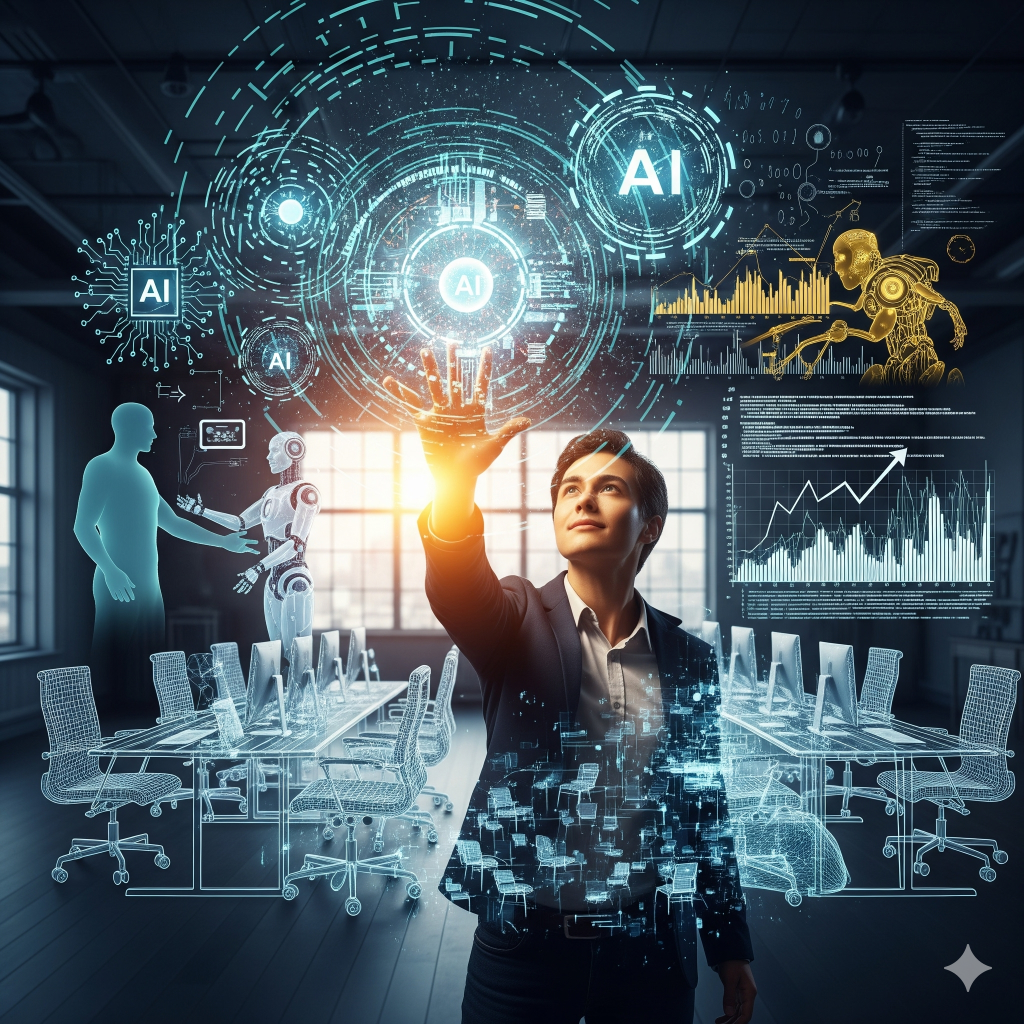
Evolve with AI and digital transformation skills!
The shift isn’t just about learning new tools; it’s about a fundamental change in your mindset. For instance, rather than memorizing every syntax rule for a new language, focus on understanding the core concepts and patterns. You can then use Artificial Intelligence to generate the initial code, and you can spend your time optimizing it, ensuring it’s secure, and integrating it into the larger system. This means your value is no longer in writing lines of code but in orchestrating the entire development process. It’s about becoming the conductor, not just another musician.
To truly thrive, you must be proactive in evolving your skills. Here’s a simple, two-step approach:
- Focus on the “Why,” Not Just the “How”: Artificial Intelligence is great at the “how”—the execution of tasks. Your job is to focus on the “why”—the strategic decisions behind the tasks. Why are we building this feature? How will it impact our users? What is the business value? These are the questions AI can’t answer, but they are the questions that will define your career trajectory.
- Become a Master of a Blended Skill Set: The most in-demand professionals are those who combine technical expertise with a key human skill. Are you a developer who is also a great communicator? An analyst who has a knack for design? Or a data scientist who understands business operations? These blended skills, where a technical foundation is augmented by a distinctly human capability, will make you indispensable in an AI-powered world.
Ultimately, your job security in this new era isn’t about what you know; it’s about how quickly you can learn and adapt. The future belongs to those who see AI as an opportunity to move up the value chain, not as a threat to be outrun. So, don’t just learn to use AI; learn to think like the architect of a new, more efficient, and more human-centered future.
The Candidateside.com Solution
This is where we come in. At Candidateside.com, we understand this new landscape better than anyone. We’re not a traditional recruiting company; we’re a reverse recruiting company. Think of us as your personal career agent. We work for you, the candidate. Because, let’s be real, navigating this new world on your own is a full-time job in itself.
In conclusion, the future of tech is bright, and Artificial Intelligence is at the heart of it. However, you don’t have to go it alone. We’ll help you showcase the skills you have and help you acquire the skills you need. We’ll connect you with the right opportunities that are looking for a unique blend of human and technical expertise. We’ll even help you craft a profile that highlights your Artificial Intelligence readiness and sets you apart from the crowd. So, why not let us do the heavy lifting?
Ready to take the next step and future-proof your tech career? Contact us today, and let’s start building your future, together. We’re here to help you get ahead in this ever-changing world of tech, one byte at a time.

